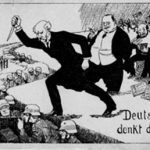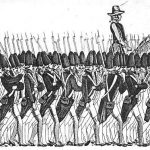It is difficult not to feel sympathy for Franz Josef, Emperor of Austria/Hungary. A dashing European prince of eighteen, he succeeded to the throne abdicated by his uncle in 1848, and stayed on it until the middle of the Great War, a world conflict he had helped to make. His reign was neither successful nor happy; his empire grew smaller and smaller and his power lessened by the year. His much loved Empress and wife ‘Sissy’ was murdered by a lunatic; his son Rudolf committed suicide, but not before murdering his fiancée; his brother Maximilian was executed by a Mexican firing squad, and the murder of his nephew and heir Franz-Ferdinand in Sarajevo plunged Europe into total war.
Biographies written about Franz-Josef do not make him attractive, though when young he was a fine athlete, excellent shot, and equipped with good looks. He always suffered misfortune in love, statecraft and war, but he proved a ruler of unusual intelligence and a certain political skill, encompassing the grinding end of Europe’s ancien regime to the epoch of jazz music, mechanised warfare and, above all, democracy – the last a hard pill to swallow.
He believed in absolute monarchy and tried to rule as such, suppressing nationalist feelings, especially Hungarian nationalist feelings, and trying to keep the peace among the ill-assorted and mostly ruinous races of his awkward Empire. Changing times forced him to make ill-felt concessions. He was naturally reactionary, and had a passion for working hard, harder than anybody, in the details of administration.
Sadly, he remained blinkered to the greater issues which he could not see and did not possess the temperament to understand. He was a highly physical man, rather than a thinker, reminding us of his romantic youth when he was tall and handsome, rather stupidly brave but unsuccessful as a soldier; he rode magnificently and could not pass the day without hunting. He was at once amiable and kindly, as well as haughty, too-well acquainted with his position, and often offensively arrogant. At home in his palaces or hunting lodge at Ischl he was Spartan in taste, keeping a frugal but healthy table. Protocol was essential to him, and he or she who crossed his rules had better beware.
Sissy, on the other hand, hated protocol and they clashed, much as Franz-Josef loved his Elizabeth of Bavaria. Here was a love story that was brief indeed. It began as a typical European fairy tale and ended in unhappiness and tragedy. Sissy was classically pretty rather than beautiful and Franz-Josef’s love for her was ‘at first sight’. He was not faithful to her, however, and she was far too lively and spirited to be a docile little Empress. His infidelities led him to treatment for a venereal disease which he passed on to her. She disliked him for it, not unnaturally, almost as much as she disliked the over-formal etiquettes of a rigid Court. She was on the side of the Hungarian protesters, eccentric in her nature, and inevitably the couple were estranged, with Franz-Josef putting the blame entirely on her, something that seems to be innate in kings. But he knew the Austrian and Hungarian people loved her more than him, which cannot have helped.
Elizabeth gave the Emperor three daughters and a son – the heir – remembered as the chief character in the tragedy of Mayerling (1859 q.v.). She was fatally stabbed in Geneva at sixty. Franz-Josef, after changing his mind once too often, decided on war with Serbia after his nephew was assassinated together with his morganatic wife. He died in 1916, well in to the twentieth century which was so unsuitable for him, in the midst of military defeats which brought an end to his Empire and his dynasty.










[…] for Elisabeth, her husband Franz Josef wasn’t exactly loyal to her. He was known for his roving eye and would often engage in […]